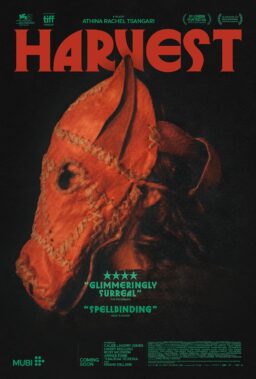Q. I just read your review of “The Contender” with Jeff Bridges and Joan Allen. My wife and I had to laugh when we saw the trailer, because we just KNEW Gary Oldman’s character was going to be an evil, mean and nasty Republican. As it turns out, we were right! “Random Hearts” is the only film I can recall where a Republican politician was treated as a sympathetic character in a Hollywood film. Can you think of any others? (Marc Giller, Tampa, FL)
A. But the movie does have positive Republican portrayals (the Allen character’s father, played by Philip Baker Hall) and Democratic sleazeballs (the characters played by Christian Slater and William Petersen). Still, you have a point about Hollywood political movies in general. This is not a conspiracy but a reflection of the tendency for liberals to be drawn to the arts while conservatives channel their energies elsewhere. There are of course exceptions. Bruce Willis and Arnold Schwarzenegger have the clout to make a pro-GOP movie if they wanted to. So does The Rock. That one I’d love to see.
Q. I recently read a review of Darren Aronofsky‘s “Requiem for a Dream” in which the reviewer encouraged teenagers to ignore the film’s NC-17 rating and do everything they could to see this film. As a 16 year-old I wonder if you think this is the right thing for teens my age. Is this another bad job of the MPAA giving harsh ratings to films teenagers should see, like “Almost Famous?” (Ryan Vooris, Herkimer NY)
A. The movie has not been rated NC-17 or anything else. But Artisan, the distributor of “Requiem for a Dream,” has announced a policy of strict enforcement of an adults-only policy. (This is an indirect endorsement of the A rating I have long suggested.) The policy has caused some theater chains to ask Artisan to share the burden of hiring the necessary security guards (or hall monitors, so to speak)–a tacit admission that rating are not much enforced at present.
Q. I have run across a website that edits movies for you. You send them a movie and they edit it to a “PG” equivalent (even movies like “Saving Private Ryan” and “Schindler's List“) using a computerized system that edits almost seamlessly. They are trying to convince movie studios to market different versions of movies–for example, PG or PG-13 versions of R-rated movies. What do you think of this idea? Personally I think it is an interesting idea, and as long as people have a choice to view whichever version they want I don’t see a problem. (Erik Goodwyn, Elizabethtown KY)
A. Much the same reasoning was used by a man named Thomas Bowdler (1754-1825), who edited Shakespeare to take out all the parts that might offend, and has been immortalized in the word “bowdlerization.” Good movies are works of art, not links of sausage. A PG-rated version of “Saving Private Ryan” would not be “Saving Private Ryan” at all. My source indicates that before Bowdler gave his name to the process, edited versions of Shakespeare were known as “castrated.” Of course, that is a word Bowdler would have frowned upon.
Q. I rented “The Whole Nine Yards” the other day, and couldn’t help but notice that some of Amanda Peet’s nudity had been covered up by a conveniently-placed railing. How long is the entertainment industry going to allow video stores to dictate what is acceptable? When I rent a video, I want to see exactly what the producers and director wanted me to see, not some CEO’s version of morality! (Kevin Ryan, Berwyn IL)
A. The silent bowdlerization of videos is a sneaky practice. When you rent a video that has been censored, inform the store manager that he has lost your business.
Q. I recently rented “On The Edge” again, with Bruce Dern and Pam Grier, and found Grier’s part had been completely deleted. Not just the sex and nudity scenes, but every reference to her character (in my opinion, a worthy plot point in Dern’s development). Was this motivated by worries about interracial relationships? That would have disturbing implications. (Steve Testori, Albuquerque NM)
A. More likely, once they took out all the sex and nudity involving Grier, what was left made no sense and also had to go. I hope you demanded your money back and told the store they had lost your business.
Q. I saw a piece on TV about an upcoming movie named “Angel Eyes.” It stars Jennifer Lopez as a uniformed Chicago police officer. I am a Chicago police sergeant, and I have been pushing a beat car for 22 years. I am also an actor and a film location safety supervisor. I have worked part-time on almost every major film production made in this town since 1985. What really made me mad was that this Chicago movie was being shot in Toronto! While the Canadian and Toronto governments have subsidized their movie industry, Mayor Daley wants to tax it out of existence. There is a six percent head tax on equipment rental and a head tax on employees. There are no good studio facilities in Chicago; we work in converted rust belt factories. We need to build a studio in Chicago and have the incentives to do work here. (Name withheld, Chicago)
A. The other side of this coin is the amusing reluctance of studios to admit their films are shot in Toronto. They send a unit to Chicago for a quick shot of the skyline, and then frame every Toronto shot to block out landmarks like the CN Tower. Why not just set the movie in Toronto? Why is Chicago seen as so desirable that movies lie about it? One theory: In TV ads, that gruff announcer’s voice saying he’s a Chicago cop! has a certain ring that he’s a Toronto cop! somehow lacks.











